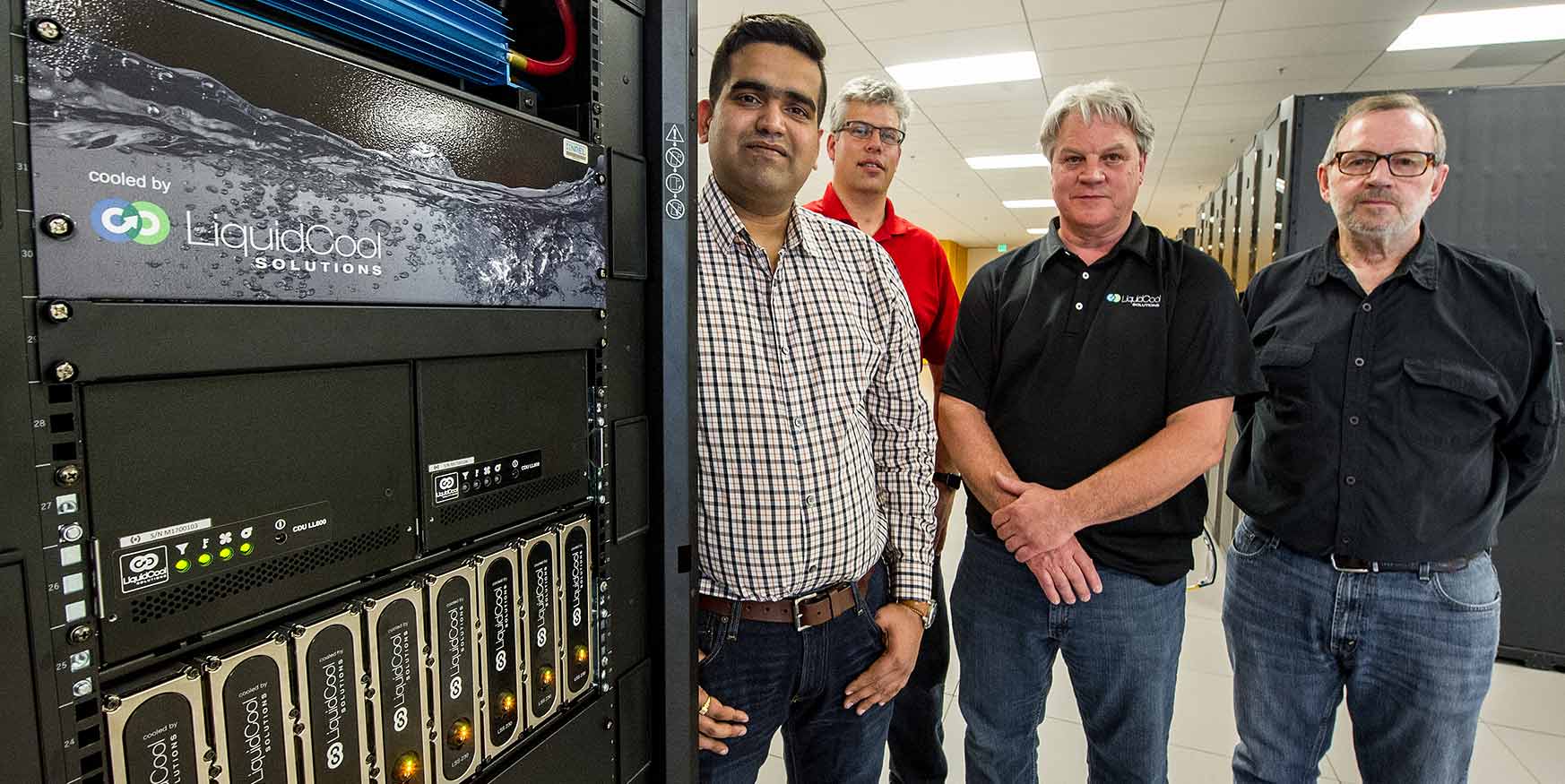IN2 Program Validates Data Center Cooling Solution

LiquidCool Solutions team members Harsh Patel, Eric Kozubal of NREL, Steve Shafer and Daryl Lautenschlager next to the LiquidCool Solutions' "Liquid Submerged Server" at ESIF's HPC data center. (Photo by Dennis Schroeder / NREL)
If your laptop has ever become uncomfortably hot, you've had a taste of what data centers worldwide are up against: Server components approaching 100 degrees Celsius (212 degrees F), with hundreds to thousands of servers per center. With data centers on average consuming an estimated 70 billion kWh per year, a disruptive energy-saving solution is needed, and a liquid-submerged server (LSS) technology from LiquidCool Solutions might be the answer.
The server, contained in a sealed enclosure filled with a recirculating flow of an electrically non-conductive heat transfer fluid, recently succeeded in validation tests through the Wells Fargo Innovation Incubator (IN2) Program at the National Renewable Energy Laboratory (NREL). There it sits alongside of Peregrine, NREL's supercomputer in the Energy Systems Integration Facility (ESIF), as a powerful computing resource for NREL researchers. The testing confirmed that the LSS technology could not only maintain target temperatures under heavy computational load, but that the hot liquid could be used to heat buildings more efficiently than NREL's current solution.
"The independent validation and results exceeded our expectations in terms of heat recovery," said David Roe, program manager at LiquidCool.
The successful laboratory evaluation is an important milestone for both LiquidCool and the IN2 program: LiquidCool was among the first companies selected to participate, and now joins its Round-1 cohorts in preparing for the market.
"One of the best things that IN2 has done for us, is that it's provided an independent validation that our technology works." said Roe. "Being able to talk about this installation at NREL has made a huge difference in the way prospective customers view our offerings."
LiquidCool applied for the IN2 program in hopes of demonstrating the usability and reliability of their product in a high-efficiency data center environment. With their servers installed in the ESIF, LiquidCool collected invaluable performance data and learned how to modify its product to suit the needs of modern data centers.
"We learned a great deal," said Roe. "Feedback from the NREL team has given us critical insight to what real customers will expect.”
Some of those qualities – efficiency of space, cost savings, energy efficiency, and protection of the electronics from corrosion and dust – are part of the LiquidCool technology.
"One of the major outcomes was finding out exactly what the value of their product was," said Eric Kozubal, principal investigator of the LiquidCool research and senior mechanical engineer at NREL. "Really, you can cut the energy costs of a data center by 40% or more by installing their product."
While the IN2 opportunity provided an important evaluation of LiquidCool’s servers, it involved only a fraction as many servers as would be incorporated in a typical data center. With LiquidCool’s project completion, their eyes are set on deploying their technology at scale: Millions of servers, as opposed to the eight at NREL.
"Demonstrating the technology at scale is the next big challenge," said Roe. "We're looking for someone who has ambitious plans for a large-scale project."
More information can be found in the report titled Innovation Incubator: LiquidCool Solutions Technical Evaluation, Laboratory Study and Demonstration Results of a Directed-Flow, Liquid Submerged Server for High-Efficiency Data Centers.
Last Updated May 28, 2025
